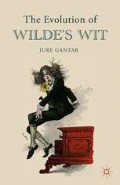Abstract
No study of Oscar Wilde’s wit can begin without making a crucial methodological concession: that even he was occasionally capable of producing bad epigrams. Though dozens of collections of Wilde’s witticisms are available in bookstores and libraries, these anthologies represent only a portion of his epigrammatic output. Just as significant is the share of his wit that has either been forgotten or gradually lost its original appeal. And it is precisely these epigrams that can serve as a perfect control group for an analysis of Wilde’s wit. The main reason for their lack of success is not so much that they are missing certain key elements—after all, Wilde’s less popular epigrams often closely resemble their more frequently quoted counterparts both in structure and subject matter—but rather that some of their essential components never reach the level where they are able to function properly. An examination of the causes of such failures can function as an ideal first step in an investigation of this topic. I will, therefore, focus, within this chapter, on those “Phrases and Philosophies” that have so far been largely ignored by the readers and the critics.
Access this chapter
Tax calculation will be finalised at checkout
Purchases are for personal use only
Preview
Unable to display preview. Download preview PDF.
Notes
Victor Raskin, “Sophisticated Jokes,” in World Humor and Irony Membership Serial Yearbook 7, ed. Shaun F. D. Hughes and Victor Raskin (West Lafayette and Tempe: Purdue University–International Society of Humor Studies, 1990), 126, 127.
Victor Raskin, Semantic Mechanisms of Humor (Dordrecht: D. Reidel, 1985), 80.
Victor Raskin and Katrina E. Triezenberg, “Levels of Sophistication of Humor Intelligent Agents,” in CHI-2003 Workshop: Humor Modeling in the Interface, Fort Lauderdale, FL, 2003: 1.
Neil Bartlett, Who Was That Man? A Present for Mr. Oscar Wilde (London: Serpent’s Tail, 1988), 56.
Salvatore Attardo, Linguistic Theories of Humor (Berlin: Mouton de Gruyter, 1994), 216.
Arthur Schopenhauer, The World as Will and Representation, trans. E. F. J. Payne (Indian Hills, CO: Falcon’s Wing, 1958), 2:92.
Plutarch, vol. 3 of Moralia, trans. Frank Cole Babbitt (London: William Heinemann, 1967–1976).
Desiderius Erasmus, Adages, trans. Margaret Mann Phillips, annot. R. A. B. Mynors, vols. 31–34 of Collected Works of Erasmus (Toronto: University of Toronto Press, 1982–2006).
Blaise Pascal, Pascal’s Pensées, trans. and intro. Martin Turnell (London: Harvill, 1962);
François de La Rochefoucauld, Collected Maxims and Other Reflections, trans., intro., and annot. E. H. and A. M. Blackmore and Francine Giguère (Oxford: Oxford University Press, 2007).
Murray S. Davis, “Aphorisms and Clichés: The Generation and Dissipation of Conceptual Charisma,” Annual Review of Sociology 25 (1999): 248.
Compare James Geary, The World in a Phrase: A History of Aphorisms (New York: Bloomsbury, 2005), 9–18.
Charles Darwin, The Descent of Man, and Selection in Relation to Sex, 2nd rev. ed. (New York: D. Appleton, 1898), 35–36.
Bohuslav Havránek, “The Functional Differentiation of the Standard Language,” in A Prague School Reader on Esthetics, Literary Structure and Style, ed. Paul Garvin (Washington: Georgetown University Press, 1964), 11.
Thomas Hobbes, Leviathan, ed., intro. and annot. Edwin Curley (Indianapolis: Hackett, 1994), 38.
See Frank Harris, Oscar Wilde, intro. Lyle Blair (East Lansing: Michigan State University Press, 1959), 39.
Dan Sperber and Deirdre Wilson, “Relevance Theory,” University College London Working Papers in Linguistics 14 (2002): 249.
John R. Gibbins, “‘Old Studies and New’: The Organization of Knowledge in University Curriculum,” in The Organisation of Knowledge in Victorian Britain, ed. Martin Daunton (Oxford: Oxford University Press, 2005), 236–38.
Bernard Beatty, “The Form of Oscar: Wilde’s Art of Substitution,” Irish Studies Review 11, no. 1 (2003): 33.
Michael S. Foldy, The Trials of Oscar Wilde: Deviance, Morality, and Late-Victorian Society (New Haven: Yale University Press, 1997), 8.
Compare Antonio Gramsci, Selections from Cultural Writings, trans. William Boelhower, ed. David Forgacs and Geoffrey Nowell-Smith (Cambridge: Harvard University Press, 1991), 98.
Mikhail Bakhtin, Rabelais and His World, trans. Hélène Iswolsky, intro. Krystyna Pomorska and Michael Holquist (Bloomington: Indiana University Press, 1984), 73.
Jonathan Dollimore, Sexual Dissidence: Augustine to Wilde, Freud to Foucault (Oxford: Clarendon, 1991), 65.
Sos Eltis, Revising Wilde: Society and Subversion in the Plays of Oscar Wilde (Oxford: Clarendon, 1996), 5.
Neil Sammells, Wilde Style: The Plays and Prose of Oscar Wilde (Harlow, UK: Pearson, 2000), 2.
Regenia Gagnier, Idylls of the Marketplace: Oscar Wilde and the Victorian Public (Stanford: Stanford University Press, 1986), 7–8.
Compare Quintilian, The Orator’s Education, trans. and ed. Donald A. Russell (Cambridge: Harvard University Press, 2001), 2:241–45.
Barbara Herrnstein Smith, Poetic Closure: A Study of How Poems End (Chicago: University of Chicago Press, 1971), 197.
Edward W. Said, The World, the Text, and the Critic (Cambridge: Harvard University Press, 1983), 41.
Copyright information
© 2015 Jure Gantar
About this chapter
Cite this chapter
Gantar, J. (2015). Damp Squibs. In: The Evolution of Wilde’s Wit. Palgrave Macmillan, New York. https://doi.org/10.1057/9781137483553_2
Download citation
DOI: https://doi.org/10.1057/9781137483553_2
Publisher Name: Palgrave Macmillan, New York
Print ISBN: 978-1-349-69591-1
Online ISBN: 978-1-137-48355-3
eBook Packages: Palgrave Media & Culture CollectionLiterature, Cultural and Media Studies (R0)

